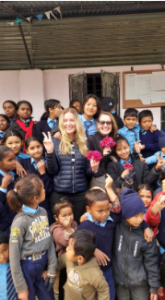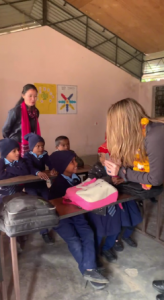
Each year, the Teacher Horizons community chooses a charity for us to donate a percentage of our placement fees to. This year, you have chosen Pipal Tree, an education charity based in Nepal, and in this article, Caroline Milne tells us more about their work.
Sitting with the nuns during morning prayer in Nagi Gumba Monastery, up a mountain in Nepal on a chilly October morning, I asked myself, ‘Who would have thought a Head of Maths from the North East of England would end up here?’ When I say mountain, I’m using it in the context of the peaks we have in the UK. I was emphatically informed by our guru, the lovely Krishna, that at a height of a mere 2732m here in Nepal, Shiva Puri is nothing more than a hill!

Why am I here?
This could be a very long story indeed, but I’ll save the details for my memoirs (for which I am still actively collecting as much material as my budget will allow). I first visited Nepal in October 2006, shortly after my teenage daughter died. As you may imagine, I was in a very fragile and confused state, but after reading a newspaper article written by the CEO of Pipal Tree, Philip Holmes OBE, about his own tragic reason for heading to Nepal, I sent a few emails, bought a ticket and ended up on a plane to Kathmandu. 17 years later and I have made several return trips, lasting from one week to eight months, and am now a trustee of the charity.

It was the best thing I could have done. In addition to the amazing and diverse scenery Nepal has to offer, the thing that made a lasting impression on me was the smiles on the faces of the young children I encountered, all of whom had had dreadful starts in life. This put my own loss into perspective and made me appreciate what I had, rather than what I had lost. In particular, I remember a Saturday morning in one of the children’s refuges I visited. The children were doing homework, of which there is always a surplus due to the nature of the Nepali education system, and found out that I was a maths teacher. After a number of years teaching maths in challenging UK schools, it was a complete, and very pleasant, shock to me when they came begging for more algebra problems to solve! On a Saturday morning. Education is very much valued in Nepal and is seen as a way to escape poverty.
How does Pipal Tree help with education?
Pipal Tree works with our partner organisations, Mithila Wildlife Trust and Lily’s Leaves, helping children, especially girls, from underprivileged communities in the south of Nepal. This is done through Community Learning Centres (CLCs), which offer much-needed extra tuition before and after school to help students access the curriculum, and by supporting a local government school.

During my recent visit, a teacher friend and I delivered some basic training in phonics and the use of songs for early years. Phonics is part of the curriculum, but is often not well delivered due to lack of experience and training. Even in such a short period of time, we felt that the input was beneficial and the English teacher was very eager to try the teaching activities herself. We are intending to continue offering support through online resources and building up a supply of short instructional videos.
No visit to this school passes without an invitation to join in the traditional dancing. Almost the whole school joined in as we were invited to dance along with staff and students. It was a true reflection of the wonderful, supportive relationships that exist in the school. The smaller children virtually emptied the school garden of all its marigolds in a bid to outdo each other in bringing us flowers.
Why volunteer with Pipal Tree?
Without doubt, participating in a voluntary capacity is one of the most rewarding things I have ever done, and I will definitely be returning to Nepal at some point in the future. I recently made the decision to start my own business that combines my background in education and professional development with an interest in health and well-being. This allows me flexibility to continue to support Pipal Tree while continuing my journey of life-long learning.

Working in education builds such a strong and diverse skill set that can be of real benefit to share with others, whether it is direct teaching input or helping in a more strategic or organisational way. The amount of time you are able to contribute is flexible depending on your circumstances, and if you are not physically able to spend time in Nepal, there are still ways to help with building suitable teaching and learning resources, and fund-raising.
Rest assured that whatever you put into a volunteer experience, you get back tenfold. It is such a rewarding adventure and makes a very valuable contribution to your own professional development that any prospective employer would appreciate. You have the opportunity to develop the sort of skills that you would not encounter, even in the best of in-school workshops.

Last, but definitely not least, it’s Nepal! It’s one of the most amazing countries I have ever visited and one of the friendliest. If, unlike me, you can climb a proper mountain, they certainly have plenty to choose from. The flat terrain of the Terai in the south is equally beautiful, with an abundance of colour and wildlife. And food! So much delicious food everywhere in Nepal.
How the donations from Teacher Horizons will help
Money raised goes towards the educational upliftment of children in Madesh Province, including providing free school rucksacks and dignity packs to encourage attendance by girls. The communities here with whom we work have a legacy of minimal levels of formal education, and we are hoping to remedy this for the current and future generations.
If you are interested in finding out more about Pipal Tree, or if you are interested in volunteering for them, please visit their website or email them directly at philip@pipaltree.org.uk.

Caroline has been involved in the field of UK and international education for 30 years. She was originally a secondary Mathematics teacher and also teaches English as a second language. She has trained both Maths and English teachers in the Middle and Far East, and delivered whole school staff development. Recently she decided to work independently, adding PSYCH-K® to the professional development she offers. You can visit her website if you’re interested in finding out more.




